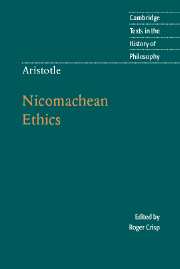Book II
from Nicomachean Ethics
Summary
Virtue, then, is of two kinds: that of the intellect and that of character. Intellectual virtue owes its origin and development mainly to teaching, for which reason its attainment requires experience and time; virtue of character (ēthos) is a result of habituation (ethos), for which reason it has acquired its name through a small variation on ‘ethos’. From this it is clear that none of the virtues of character arises in us by nature. For nothing natural can be made to behave differently by habituation. For example, a stone that naturally falls downwards could not be made by habituation to rise upwards, not even if one tried to habituate it by throwing it up ten thousand times; nor can fire be habituated to burn downwards, nor anything else that naturally behaves in one way be habituated to behave differently. So virtues arise in us neither by nature nor contrary to nature, but nature gives us the capacity to acquire them, and completion comes through habituation.
Again, in all the cases where something arises in us by nature, we first acquire the capacities and later exhibit the activities. This is clear in the case of the senses, since we did not acquire them by seeing often or hearing often; we had them before we used them, and did not acquire them by using them. Virtues, however, we acquire by first exercising them.
- Type
- Chapter
- Information
- Aristotle: Nicomachean Ethics , pp. 23 - 36Publisher: Cambridge University PressPrint publication year: 2000
- 3
- Cited by



